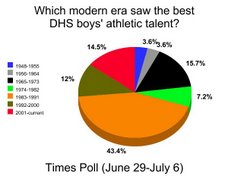 Could forced school consolidation be coming our way? Perhaps.
Could forced school consolidation be coming our way? Perhaps.Below this post, we've published a list of reasons why small schools are superior to larger institutions. Not everyone agrees -- and in Lincoln at the State Capitol, we know some lawmakers would love nothing more than to way a wand and have many small schools disappear.
The Times has been informed that Norfolk State Senator Jim Scheer has introduced legislation (Legislative Bill 49) to create what he calls "allied school systems." (UPDATE: The Times has been told that this bill will get a hearing by the Legislature's Education Committee on Tuesday January 27, in Room 1525 of the State Capitol at 1:30 p.m. Any one from the public can testify. Readers can see the bill language for themselves by clicking here. The underlined language would become new law if the bill is approved, according to a source.)
The bill, according to information we were e-mailed, aims "to increase educational opportunities and equity for students statewide."
If the bill were passed by the Legislature and signed by Governor Ricketts, all Nebraska school districts with under 650 students in K-12 (that includes Dorchester, Friend, Milford, Exeter-Milligan, Wilber-Clatonia, Meridian and many other surrounding schools) would be forced to create "allied school systems" no later than July of next year.
These systems would be, in essence, forced mergers consisting of at least three small school districts. (To rub salt in the wound, one of the school districts in the system would need to have more than 150 students in K-6.)
If school districts did not voluntarily join an "allied school system," the Nebraska Commissioner of Education could force schools into a system of his choosing.
We have no idea if this bill has a chance of getting through the Legislature, but apparently some in the Legislature believe small school districts cannot do an adequate job of educating our kids.
This bill would be a major step in forcing small schools across the state to eventually consolidate, regardless of what contrived name a state senator calls the process.
We wonder if Senator Scheer has compared dropout rates in Omaha Public Schools and Lincoln Public Schools with those of Nebraska's small school districts.
We wonder if he realizes that small, farm-based school districts (through the loss of state aid dollars, despite the heavy property tax burden) are helping subsidize Class A and B schools in Omaha and Lincoln -- and even those in smaller cities like Norfolk and Crete.
With rare exception, most small school districts in Nebraska are funded mainly by local tax dollars. If the state wants to shoulder that financial burden, then maybe we can talk about consolidation.
But until that occurs, what is it about "local control" that these politicians don't understand?


















































I have stated my opinion before that education is, and always has been, a matter local policy. It has been shown that whenever the State or Federal systems try to wrest that control away from local Boards of Education, the school systems and ultimately, the students, suffer the consequences. Our local systems are sustaining themselves and serving the student population very well. Our students are challenged, both academically and socially, and they have responded to that challenge by achieving academic success along with heavy involvement in extra-curricular activities. Senator Scheer is sadly mistaken in his attempt to treat local Boards like wayward children who need guidance and assistance to properly educate the children of our community. I call on all residents of communities that might be affected by this bill to call and write members of the Legislature, as well as Governor Ricketts and register your displeasure with this misguided attempt to change something that is working quite well. If the decision were ever made (something I hope never happens) to end the Dorchester School District, it must only be made by the voters of this district, not some group of muddled thinking politicians in Lincoln. Our children are the future of our community. Without the school to bind the children to a sense of hometown pride, I fear for the future of this very special small town which I have grown to love.
ReplyDeleteI have contacted several State Senators about this Bill. Here is the reply I received from Senator Kintner today: This is the reply I received from Senator Kintner, this afternoon.
ReplyDeleteSenator Bill Kintner I remember when Senator Scheer introduced it last year, all heck broke loose. It looks like he has added language to prevent consolidation.
Here is what his former aide wrote about it.
I served as Sen. Scheer's legislative aide when he first introduced this bill (last session). It's unfortunate that the press is once again misrepresenting the intent of the legislation. It does not force merger. In fact, properly implemented, it could very well slow and prevent consolidation.
The bill would merely require a few districts to join together (at their choosing) and agree to a uniform schedule for purposes of expanding course options and opportunities. These districts do not need to be geographically aligned: a district in the Panhandle could align with a district in Southeast Nebraska. Using distance learning technology, they could expand learning opportunities by offering, for instance, two languages instead of one, career-technical courses, advanced placement courses, etc.
The bill would be a great opportunity for students, many of whom are leaving small districts for larger districts in order to take advantage of greater course offerings (we were contacted by several students who shared their story and were excited about this legislation, as well as several administrators who thought it was a forward thinking, great idea). Unfortunately, many adult interests got in the way, perhaps spurred by fears that such collaboration could eventually lead to less need for so many superintendents, teachers, etc. The fact the bill did not pass last year (after a threatened filibuster) was a clear example of lawmakers putting adult interests ahead of students.
My answer to him:
If the intent of the bill is not to "force" consolidation, but instead to increase course offerings through the use of distance learning technology, it would be worthy of consideration. In today's world you can take post-secondary and post-graduate courses on your computer; there should be no reason that high school students throughout the state should not have that same opportunity. The use of technology to expand educational opportunities is always a good thing. We do need to monitor the progress of this bill through committee, to make sure its intent stays clear and focused, while maintaining local control over local issues.
Hmmmm. Sounds like a state gov't bureaucrat trying to justify her job. I think the locals are intelligent enough to figure out how to use the Internet to expand course offerings for high schoolers.
DeleteAs for her remark that many students in small school districts are leaving for large school districts, I say "BULL PUCKEY!" I've seen just the opposite occur.
Hands off, state bureaucrats.
Here is a conversation I had with Senator Ebke this morning on the issue:
ReplyDeleteSenator Laura Ebke Mr. Hoffman, I am very sensitive to local control issues. I just don't know the underlying intent of this legislation. The last section of the bill specifically states that there is nothing in the bill that will require merger or consolidation.
I'll listen to all sides on this. My daughter taught in Dorchester for 3 years (this is her first year out of that district). I have great respect for the smaller school districts.
There are a lot of issues to deal with here. Constitutionally, it is the role of the state (Article VII, Section 1) to provide for education. Historically, the state did that by creating school districts which were largely autonomous--but which also provided most of their own funding.
We should sit down sometime and talk about the array of issues--both fiscal, and philosophical.
I'll talk with Sen. Scheer this week and see if I can get a better sense of what he's trying to do with this bill.
Donald Hoffman Thank you, Ma'am, that is all I can ask. I appreciate your candid response to my question and I look forward to discussing this issue in the future. Have a great Sunday and good luck with your new job.
We all need to be involved in this process to make the Senators and the Governor aware of the issue.
Another reply from Senator Ebke today:
ReplyDeleteSenator Laura Ebke Indeed, we need to follow the bill--and any changes--carefully. There is a whole thread in a discussion on this issue on my personal Facebook page. Sen. Scheer's former aide responded similarly on my page (perhaps where Sen. Kintner found it).
As I stated there, I'm not in favor of anything that forces schools to consolidate--at the very least, that should be the very last option. But if this expands opportunities for kids, I have a hard time seeing the downside. The devil is often in the details, though, so I'll be following this closely, and I'm sure we can talk more about it once it starts the committee process. I'd encourage folks to go to (or watch online) the committee hearings, as well.
I think I'm starting to understand what the local government folks mean when they talk about "federal and state mandates."
ReplyDeleteInteresting idea here, but wouldn't stronger assessments be better than this type of micromanagement?
Local control is important, that said, often local control is in the hands of people not best suited to deal with it.
ReplyDeleteI get the economics of K12 education, there are definitely advantages to consolidation as there are disadvantages.
the "blog post" indicates the lion share of property taxes go to Omaha or Lincoln schools, based on my understanding of the way schools are funded
in Nebraska the property taxes allocated for schools stay in the "Legislative District" in which it is collected. So your information is wrong in that vein.
When I was a student in k12, i was in a Class D school for a few years before my parents moved to "town" where we attended a Class B school.
There is a BIG different in what curriculum can be available to the students.. In the class D school "our coach" was also the shop teacher, (a farm welding shop) and he taught drivers ed.
In the class B school there was a coach, and a couple shop teachers. and the shop included woodworking, metal shop, welding, electrical.
Unfortunately the "quality" of education does suffer in Class C or smaller schools because of the ability to "pay quality" teachers is much like medical personnel,
it goes to cities like Omaha or Lincoln.
Here is the crux. Dorchester (and other small districts) pays beginning teachers substantially less compared to
what a beginning teacher can make in Millard, or Papillion. and the work load expected of that teacher by the "district" and "parents"
is overwhelming for many of these new graduates.
Consolidation allows for economics of scale in facility, hiring and pay.. What I have found over the years is communities resist consolidation
largely because of "Old Rivalries" not common sense, It takes a generation of students to reap the benefits of consolidation and get out of the past.
Resistance to mergers is usually based rivalry on the football field, not on thoughts about how we educate our kids.
Face it. property taxes will continue to increase to support schools, all the while quality of these small schools both in facility and content are not improved.
the notion of "drop out" rate, is irrelevant if you pass F or D students through to graduation. They have a High School diploma but likely read at a 6 grade level.
I know of students who for all intent and purpose being equal one came from a small district, another from a city district.
Each applied to various colleges. the small school student came in at the top of their High School class, but was not prepared for college and needed remedial assistance. While the other student
came in prepared to hit the ground running, the later graduated from College in 4 years, the prior took 6 years.
In terms of preparing kids for a future, today's farmers can't get by with a less that adequate K12 experience, they won't know how to deal with economic issues of modern commodity markets, because it isn't taught, their math, reading and science skills will be 1/2 of a comparable student in a consolidated district. what does that mean in "life terms"..
Community autonomy is important, and losing rural communities is occurring at an alarming rate. But to avoid dealing with hard issues is costing our kids much in in being competitive of on the world job markets.
There are big problems with education at every level from Kindergarten to Post Doctoral ..
the biggest problem is economic. the almighty dollar.
Doane College as example costs in excess of $30,000 per year. Students who graduate in 4 years will still have 50-100k in debt, and will at best begin working as a teacher for 20k.
If a student takes another year or two because of inadequate k12 preparatory work, add another 20-30 in debt in top of that.
Question to the concerned anonymous writer above:
DeleteWhat is your agenda? Do you realize most larger schools turn out "one trick ponies" (academically, socially and athletically), many of whom struggle once outside of the classroom?
Soooooo tired of the elitists telling us "rural folk" what's best for us.
ReplyDeleteJim should be working on building roads from Norfok to I-80 instead of picking on small schools.
As a Dorchester alum I like keeping up with happenings via this website, but shame on you Dorchester Times for this headline. Have you read the bill? The last line item (section 5) very clearly states the legislation isn't intended to force schools to consolidate. The letter of intent doesn't go very far to answer my questions about the perceived benefits from these actions but instead of throwing out insults about Senator Scheer, I'll just email him and ask. I encourage you to do the same.
ReplyDeleteChandra (Tuttle) Wondercheck
I read the bill, too, Chandra, but I gotta be honest and say I agree with the Times. The bill lists all these mandates for small school districts (same class schedules, periods, etc.), then at the very end of the bill says "this shall not force school consolidation or mergers." It's kinda like President Obama laying out his health care mandates and saying if you like your plan, you can keep your plan. We know how well that turned out. Sounds like the senator from norfolk shoulda ran for his local school board instead.
DeleteRemember Class I schools? Those were the country schools that once dotted the Nebraska landscape up until about 10 years ago.
ReplyDeleteThe state pulled all state aid from those districts, but when they did, the bureaucrats said they were in no way telling these districts they had to close. Wanna bet that guys like Senator Scheer will soon offer bills to quit sending any state aid to schools under 500 or 650 kids?